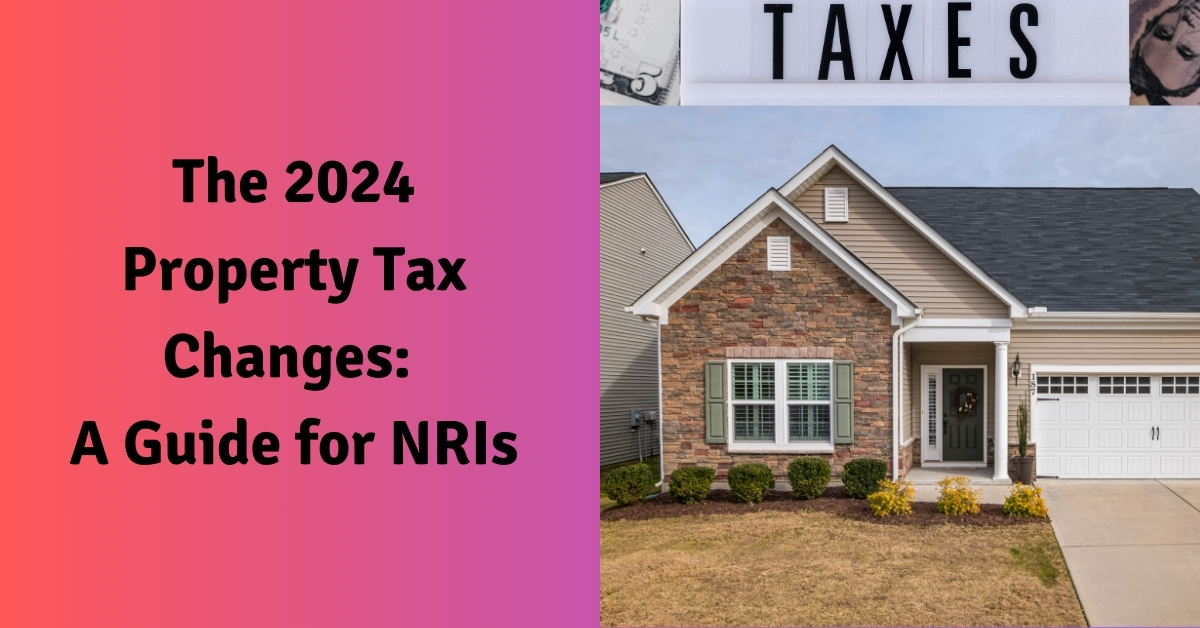The 2024 Property Tax Changes: A Guide for NRIs

Big changes happened in property taxes this year. Starting July 23, 2024, the government changed how they tax profits from selling property. While people living in India got some nice benefits, NRIs (Indians living abroad) didn’t get the same deal. Let’s break down what this means for everyone, especially NRIs who own property back home.
Join our exclusive NRI-only WhatsApp Community:
https://chat.whatsapp.com/EZARhvy3JkED1TF3qjL4Jy
What Changed in Property Tax Rules?
If you live in India and bought property before July 23, 2024, you now have two choices:
- Pay 20% tax and get inflation benefits – This means the government considers how prices have gone up over time
- Pay less tax (12.5%) but skip the inflation benefits
But if you bought property after July 23, 2024, you have to pay 12.5% tax without any inflation benefits.
Why NRIs Got Left Out
Here’s the catch – these new rules only work for people who live in India and certain family groups (called HUFs). If you’re an NRI, you don’t get to choose between these options. Companies and business partnerships also don’t get this choice. This wasn’t a mistake – it looks like the government meant to do this on purpose.
How This Affects NRI Property Owners
NRIs face three big problems when selling property in India:
- Getting the Right PriceMany buyers in India like to pay some money in cash to save on taxes. But NRIs can’t do this – they must use bank transfers for everything. This makes it harder to find buyers willing to pay full price.
- Tax Deduction HeadachesWhen NRIs sell property, the government takes out a bigger chunk of tax right away. Getting permission to pay less tax upfront (called a lower TDS certificate) is really tough.
- Sending Money HomeNRIs need a special certificate (called 15CB) from an accountant to send their money abroad after selling property. This adds extra work and time to the whole process.
Conclusion
While the new tax rules make things easier for people living in India, they don’t help NRIs at all. If you’re an NRI with property in India, these rules – plus all the extra steps needed to sell property and send money home – can make things pretty complicated. It’s important to follow the rules and maybe talk to a tax expert about the best way to handle your property.
Navigating tax implications on property sales, capital gains, and repatriation requires careful planning to avoid unnecessary liabilities. Consulting an experienced NRI tax advisor can help you structure your transactions efficiently, ensure compliance with Indian tax laws, and optimize your financial outcomes.
FAQs’
1. What’s the new tax rate for property profits in India?
Ans- People living in India can now choose between 12.5% tax (without inflation benefits) or 20% tax (with inflation benefits) if they bought property before July 23, 2024.
2. Can NRIs pick which tax rate they want?
Ans- No, NRIs don’t get to choose. These new options are only for people living in India.
3. What’s this “inflation benefit” everyone talks about?
Ans- It’s a way to pay less tax by considering how prices have gone up since you bought the property.
4. What if I buy property now?
Ans- If you buy after July 23, 2024, you’ll pay 12.5% tax without any inflation benefits – no choices here.
5. Why didn’t NRIs get these new benefits?
Ans- The government made these rules specifically for people living in India. They haven’t explained why NRIs were left out.
6. What makes selling property hard for NRIs?
Ans- NRIs must use bank transfers (no cash), pay higher upfront taxes, and deal with extra paperwork to send money abroad.
7. Can NRIs reduce their upfront tax payment?
Ans- Yes, but it’s complicated. You need to apply for a special certificate, and it’s not easy to get.
8. What’s this 15CB certificate about?
Ans- It’s a document from an accountant that NRIs need to send their money abroad after selling property.
9. Are businesses also left out of these new rules?
Ans- Yes, companies and business partnerships don’t get these new tax choices either.
10. How can NRIs handle their property taxes better?
Ans- Talk to a tax expert who knows NRI rules – they can help you find the best way to manage your taxes.
Disclaimer: The information provided here is for educational and informational purposes only and should not be construed as financial, legal, or tax advice. Consult with a qualified professional before making any investment decisions. We do not accept any liability for errors or omissions in this information nor any direct, indirect, or consequential losses arising from its use.



